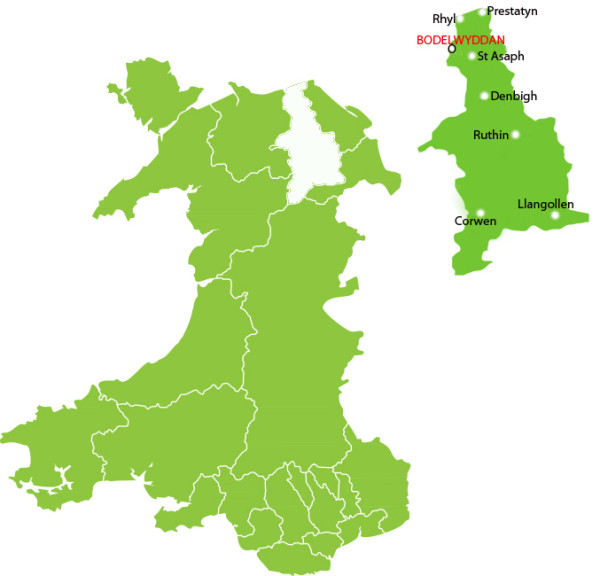I had intended writing something similar to this post a while back, when I heard that Cymdeithas yr Iaith Gymraeg (the Welsh Language Society) was launching a new campaign. For those who’ve missed it; the ‘campaign’ has started, but seems to consist of nothing more than small groups chaining themselves to the gates of out-of-the-way governm ent buildings where the chainees are ignored, by the media and just about everyone else. As campaigns go, this exercise in futility is going nowhere.
ent buildings where the chainees are ignored, by the media and just about everyone else. As campaigns go, this exercise in futility is going nowhere.
Having originally decided that CyI and the non-campaign wasn’t worth the effort of a post, I have changed my mind over the past few days for reasons alluded to in the title. The bigotry is that exhibited by the sad git working in some Cardiff shop, who said on Facebook, “I love wales and it’s beauty, but the welsh language gets right on my fucking nerves. Two girls in the shop at the moment speaking to each other in welsh. I’ve had to turn bobby womack up to 8”. As the piece in Daily Wales, and the comments it attracted show, there were attempts to explain or laugh off the outburst. One comment even tried to justify the bigotry by claiming that Welsh is not a “mellifluous” language. In which case, neither is German, or Russian, or countless other languages. While on the other hand, French is very ‘mellifluous’, but that never stops those who share Shop Boy’s anglo-insular views from detesting Johnny Frog and everything about him and his culture.
So, we start with a clear and indefensible case of bigotry, which should have been followed by apologies all round, apologies accepted, end of story. But, no; for this morning, the radio station misrepresenting itself as BBC Wales put out a phone-in programme asking why so many people are upset by the sound of the Welsh language. (Availa ble here.) Note that the ground of the debate has now shifted significantly. In less than forty-eight hours it has become an established fact that the sound of the Welsh language is irritating; and this elevates Shop Boy to the status of martyr, standing up to tyranny on behalf of the silent majority!
ble here.) Note that the ground of the debate has now shifted significantly. In less than forty-eight hours it has become an established fact that the sound of the Welsh language is irritating; and this elevates Shop Boy to the status of martyr, standing up to tyranny on behalf of the silent majority!
Proving yet again that whatever independence the BBC once had is long gone. What’s more worrying is that the Beeb isn’t even being run by Tory central office, it’s being run by the intelligence services. Alex Salmond has a lot to answer for. Keep it up, Eck!
I wasn’t able to hear the whole show but one woman I did hear made cogent points about expenditure on the Welsh language. Which I think is where language campaigners have got it very badly wrong. It boils down to psychology. Put yourself in the position of someone who does not speak Welsh, is not hostile towards the language, but one day – maybe low on funds – has a revelatory moment when he receives his bilingual council tax demand or electricity bill, and says to himself, ‘How much am I paying to have my bill translated and printed into a language I don’t understand?’ At that point he switches from ambivalence towards the Welsh language to hostility. And there are hundreds of thousands like him. And it’s all so unnecessary.
It happens because CyI has, for decades, pursued the strategy of recognition and visibility. In essence, this demands – in addition to pointless tokenism – that the Welsh language must have equal legal status with English, and must be seen and heard, everywhere in Wales on a par with English. Which is fine . . . up to a point. That point being that Gwynedd is not Gwent, Maenchlochog is not Manorbier. While the most virulent bigot living in Gwynedd cannot reasonably object to expenditure on a language he hears spoken all around him, no one should be surprised when an otherwise proudly Welsh anglophone in Abergavenny questions similar spending in his area. Without I hope sounding like an Adferwr I think we have to accept these differences.
Cymdeithas yr Iaith Gymraeg’s refusal to accept them has had two consequences. First, comprehensive bilingualism, across the country, in every aspect of life, does not establish a bilingual country – it just pisses off too many people unnecessarily, few of them bigots. Secondly, and perhaps more importantly, by quixotically pursuing this policy of national bilingualism Cymdeithas has left Y Fro Gymraeg undefended, and seriously damaged the language’s chances of survival.
For where was Cymdeithas yr Iaith a few years ago when Tesco opened its new store in Porthmadog and shipped in an English workforce of over 100? And what of the other retail chains and businesses doing the same thing in Gwynedd and other Welsh-speaking areas? Are we to believe that this doesn’t affect people’s ability to use their mother tongue in their everyday lives? That this doesn’t deprive Welsh speakers of jobs in their own communities? How can anyone argue that the survival of the language is better ensured by demanding ‘Talu Yma’ signs in Cardiff stores, or insisting that the proceedings of Merthyr council’s sub-committee on rat infestation are published bilingually? This begins to sound less like a strategy to save one of Europe’s oldest languages and more like job creation for those CyIG members and former members with translation businesses.
And don’t answer me with the old nonsense about ‘dividing’ Wales along language lines. Wales was already divided, and enforced bilingualism across the board is only exacerbating the problem. Worse, by turning people against the language you risk turning them against all things Welsh and losing them entirely. (Plaid Cymru being a good example.) To the point where a cynic – no, not me – could argue that Cymdeithas yr Iaith Gymraeg has, over the past thirty-odd years, failed miserably at what it claimed to be doing, yet has successfully queered the pitch for many others.
What is needed is a strategy to, firstly, defend what remains of Y Fro Gymraeg. Then take the fight outside of the heartland to those who want it. For example, by getting involved in any struggle for Welsh language education; or any fight against the overdevelopment of a community where the language is still relevant. Finally, reach ou t beyond these areas and groups to those who identify with Wales and are proud to be Welsh, make them see the language, not as a threat, or a waste of their money, but as a vital and desirable part of our shared heritage.
t beyond these areas and groups to those who identify with Wales and are proud to be Welsh, make them see the language, not as a threat, or a waste of their money, but as a vital and desirable part of our shared heritage.
From now on, campaigners for the language need to be more realistic in their ambitions, they need to understand contemporary Wales better (perhaps by moving outside their own circles a bit more), and they need to be a lot more hard edged in their approach. Forget the idiots on radio phone-ins, they are not the real enemy, they are just ammunition for the enemy. The real enemy is those you hope to persuade with the reasonableness of your demands, the virtue of your case. Those who smile and sound sympathetic but are not the reasonable and fair-minded people you want (and they want you) to believe they are.
That is because every survey ever conducted has shown that Welsh speakers are more likely to want greater devolution and independence than English speakers. That being so, only a simpleton would believe that the UK government (or its civil servants who run Wales) will allow – let alone welcome – an increase in the numbers and percentages of Welsh speakers; or think that an anti-Welsh Labour Party down Cardiff docks – knowing that Welsh speakers are less likely to vote Labour – harbours anything but ill-will towards the language and those who speak it.
Understand that the UK Government, the ‘Welsh’ Labour Party, and many, many others have a vested interest in seeing the Welsh language dead. With a nice headstone erected . . . in Welsh, of course. (Translation available from the nice English lady at the desk, her with the CADW badge.)




